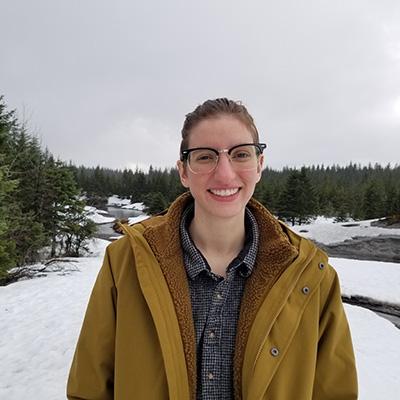-
About
- Leadership & Faculty
- News & Events
-
Academics
- Graduate
- Advanced Clinical Training
- Continuing Education
- Academic Departments
- Academic Offices
- Simulation Experiences
-
Student Life
- Offices
-
Research
-
Hospitals & Clinics
- Emergency Care
- Hospital Services
-
Community Outreach
- Volunteer
Mastering Conservation
Cummings School Program: Master of Science in Conservation Medicine (MCM)
Undergraduate Studies: BA in international studies, American University
Favorite MCM Course: Ecology and Conservation Biology
Case Study Project: Intersectionality in the Environmental Field: A Theoretical Framework toward a More Equitable Future
Externship: Research in conservation biology with a Tufts PhD candidate
Pronouns: they/them/theirs
“Cummings School is the only place I applied to for grad school,” admits Mel Izard, VG21. “I liked that the Master of Science in Conservation Medicine emphasized its desire for students with different backgrounds. I had a bachelor of arts degree going into a science program, and I could tell that my perspectives and background would be valued here.”
Izard brings an international perspective to a passion for conservation. Originally from Amherst, New York, they attended American University, earning a bachelor’s degree in international studies with a thematic concentration in environmental sustainability and global health, a regional concentration in Latin America, and a minor in Spanish and Latin American studies.
Studying abroad at the Universidad Nacional de Costa Rica, Izard enjoyed the immersive homestay experience and learning how Costa Rica preserves its biodiversity. They also interned at the Inter-American Commission on Human Rights as an undergraduate, while maintaining a full course load and working part-time.
“It was amazing to be a part of something bigger than myself,” Izard explains. “Human rights work can be emotionally draining, but is so important and rewarding.”
For their undergraduate capstone project, Izard created a framework to evaluate disability inclusion in disaster risk policies.
After graduating in 2018, they worked for two years at a law firm in Buffalo. In their free time, they volunteered at a local wildlife center and advanced their interest in environmental conservation.
Izard enrolled in the Master of Science in Conservation Medicine (MCM) program at Cummings School of Veterinary Medicine at Tufts University, a one-year program that focuses on global health issues and explores scientific, political, social, cultural, and economic solutions.
The program expanded their expertise into the sciences. “The Ecology and Conservation Biology course was a great baseline for me to expand my knowledge of the environment from a more humanities-based perspective to a more science-based perspective,” Izard remarks. “I also loved Engineered Solutions.”
With a cohort of just 20 students, Izard liked the small class size and how well they got to know each other.
For their case study project, Izard worked with a classmate, Tara Brew, to assess various theories of environmentalism, such as ecofeminism, queer ecology, and ecosocialism. They evaluated these theories, determining overlap and interaction between socially constructed categories and environmental health, safety, and equity to create an intersectional framework to address environmental issues.
After graduating last August, Izard drove to Juneau, Alaska, in November for their new job.
“The journey here was quite a ride,” Izard quips. “My dad and I went through two blizzards but I saw some of the most beautiful views I’ve ever seen.”
Izard is a development and outreach associate for the Southeast Alaska Conservation Council (SEACC), a nonprofit organization that advocates for the Tongass, the waters of the Inside Passage, and Southeast Alaska’s unique way of life for more than 50 years.
“This is exactly what I was looking for—a mix between my passion for humanities and conservation,” Izard declares.
In their free time, they hike often, enjoying the unique natural landscape of Alaska.
“It didn’t take long to fall in love with this place,” Izard confesses. “It’s so beautiful, unlike anywhere I’ve ever been—the mountains, the water, and the trees. I can’t imagine myself living anywhere else.”
(Students in master of science programs at Cummings School of Veterinary Medicine follow an academic calendar that runs 12 months each year beginning in August.)
